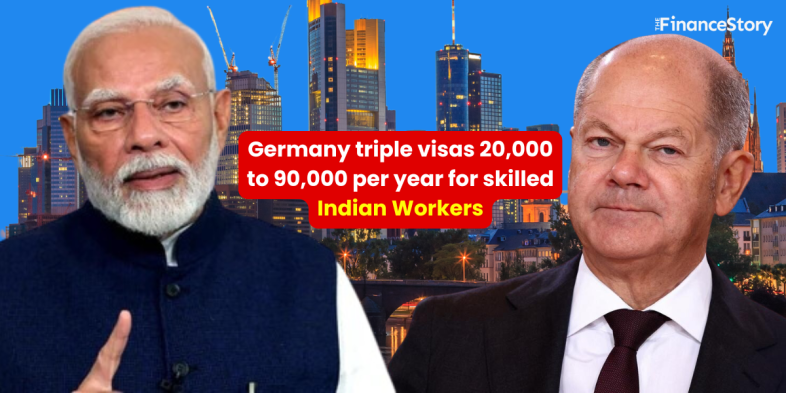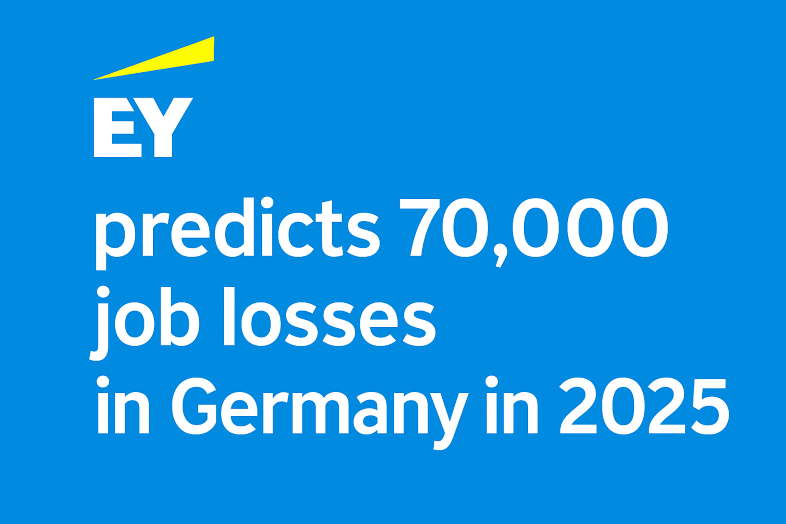- Germany is Europe’s biggest economy and the world’s third-largest. However, a new report by EY reveals a stark picture.
- In 2024 alone, over 100,000 jobs have been lost in its industrial sector.
- Since 2019, a total of 217,000 jobs have disappeared.
- The biggest blow? Automotive.
- Other sectors hurting: Machinery. Textiles. Metals.
- What’s behind the crisis?
Germany is struggling
In 2018, the industrial sector recorded a peak employment level of around 5.7 million.
Since mid-2024, Germany’s industrial workforce shrank by 1.8%, leaving it at 5.46 million people.
The most affected sector? Automotive. 45,400 jobs have been cut in the auto industry alone.
Why?
-
Declining sales: Demand for traditional combustion-engine cars is dropping fast.
-
Rising competition: China’s EV companies are scaling up and grabbing global market share.
-
Cost pressures: High energy, labour, and production costs are squeezing margins.
-
Global slowdown: Weak international demand is hitting German exporters hard.
EY’s Managing Partner Jan Brorhilker warns that another 70,000 jobs could be lost by the end of 2025.
The German Automotive Association (VDA) has urged the government to step in, saying Germany is losing its edge as a place to do business.
But it’s not just about jobs
Germany’s reputation has long been built on world-class precision engineering — from cars to complex machinery.
But global dynamics are shifting fast.
Countries like the US and China are leapfrogging ahead in:
-
Technological innovation
-
Clean energy transition
While Germany did not!
To stay relevant, Germany must undergo two urgent transformations:
-
Digital transformation: Automating production, adopting Industry 4.0 technologies, and harnessing data to boost efficiency.
-
Green transformation: Investing heavily in environmentally sustainable manufacturing and clean energy to meet tightening climate rules and consumer demand.
Other factors dragging Germany down?
Germany is grappling with a declining work ethic
- Average working hours: ~34 hours/week — Yes, Germany has among the lowest average work hours in the OECD.
- It also has high sick leave and generous vacation policies.
- Chancellor Friedrich Merz (who assumed office on May 6, 2025) has proposed reforms, including tax incentives and an “active pension”, to encourage greater workforce participation.
Infrastructure is another pressing issue
- Thousands of bridges and schools are in disrepair; due to under‑investment, bureaucracy, and a labour shortage.
- The government’s €500 billion infrastructure fund aims to fix this!
Labour shortages
- 20 million expected retirements
- But workforce inflow? Only 12.5 million!
 Also read: Germany increases visa for skilled Indian workers
Also read: Germany increases visa for skilled Indian workers
Germany’s response
Germany’s new government is moving swiftly.
In early June 2025, Chancellor Friedrich Merz’s Cabinet approved a bold “growth booster” program designed to make Germany more attractive for business investment.
Key highlights include:
-
Generous tax write-offs for machinery and equipment investments over the next three years.
-
Gradual corporate tax cut: From 15% down to 10% by 2032
-
Tax breaks for EV purchases in the coming 2½ years
-
Incentives for R&D and innovation
Apollo Global Management, a US-based private equity giant, has announced plans to invest up to $100 billion in Germany over the next decade.
Apollo’s president, Jim Zelter, shared the news in Berlin, calling it a strong vote of confidence in Chancellor Friedrich Merz’s pro-growth agenda.
This could be a game-changer for Europe’s biggest economy!
Germany’s Job Market in 2025?
During the pandemic, Germany saw a hiring boom — especially for international talent and part-time roles. But that momentum has slowed.
In 2025, the market will be tight and competitive. The country just exited a recession, and job creation — especially in the industrial and services sectors — is struggling to keep up.
If you’re planning to move to Germany, aim to be there before August–September, when most positions (including part-time ones) tend to fill up.
Key takeaway: It’s not the same Germany as 2021–2022.
Wrapping up…
With manufacturing shrinking in Europe’s biggest economy, global companies are rethinking:
-
Supply chains
-
Talent sourcing
-
Cost centers
Countries like India, UAE, and Southeast Asia stand to gain as companies relocate, outsource, or hire remotely.







